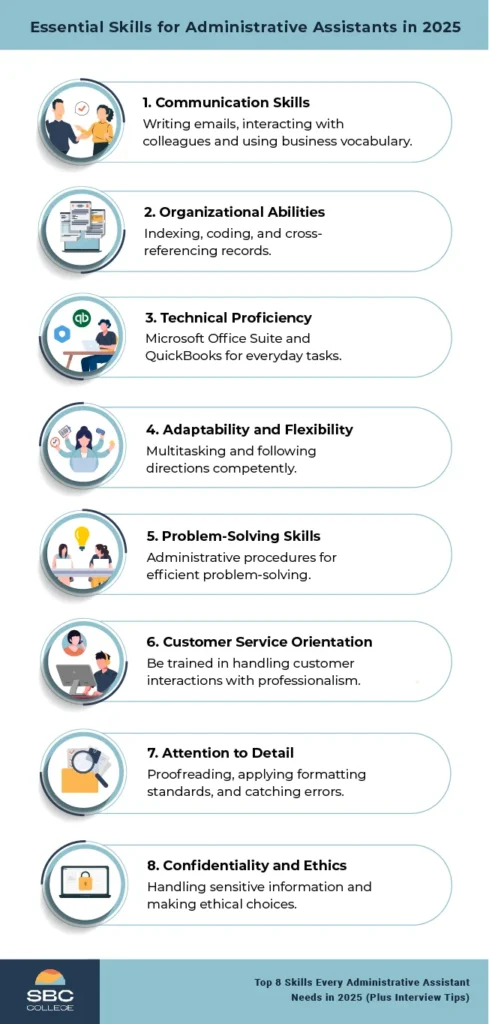Table of Contents
The role of an administrative assistant in today’s workplace is more versatile than ever. In 2025, that includes being tech savvy, highly organized, and able to communicate professionally.
This blog outlines the top 8 skills you need to succeed and shares proven interview tips to help you stand out and secure your next role.
Listen to: Top 8 Skills Every Administrative Assistant Needs in 2025 (Plus Interview Tips)
Advanced Communication Skills
As an administrative assistant, you’ll often be the first point of contact when clients, visitors, or staff members reach out to the office — by phone, email, or in person. Whether you’re responding to a client, drafting letters for your manager, or sharing meeting notes with your team, your communication skills set the tone for how the organization is perceived.
That’s why it’s important to be trained in all aspects of professional communication; including email and letter writing, public speaking, customer interactions, and business vocabulary. Having these admin assistant soft skills will help you represent your organization with professionalism in every interaction.
Organizational Abilities
Ever been handed a stack of paperwork and asked to “just make sense of it”? That’s where your organizational abilities come in.
In an admin assistant role, you’re required to sort schedules, manage files, and keep records in order while meeting timelines.
To get that done on time, you will need strong time management skills. To do it well, you need to be skilled in coding, indexing, and organizing documents. That includes working with alphabetic, subject, geographic, and numeric filing systems, as well as creating logs for records retention, transfers, and requisitions.
These are practical skills that help keep information organized, accessible, and up to date in any office setting.
Technical Proficiency
Are you someone who keeps multiple browser tabs open to finish a task?
For administrative assistants, it’s common to work with several workplace tools at once. You might update a spreadsheet, manage schedules, and organize contact lists—all while switching between tools.
This means learning to use office software like Excel, Word, Outlook, Access, and QuickBooks, along with building strong typing skills.
Merly W., Administrative Assistant Program instructor at SBC College, shares how students build these skills during their training:
“Students learn to create business documents in Word, build spreadsheets with formulas and financial functions in Excel, manage data and reports in Access, and design full presentations in PowerPoint. With regular keyboarding practice, they also develop the speed and accuracy needed for busy office settings.”
Andrew C., who teaches the accounting components, adds:
“They also gain accounting experience in QuickBooks by setting up customer accounts, processing payments, managing sales, and generating financial reports.”
By being comfortable with these tools, you’ll be able to manage daily administrative tasks and support your team more effectively.
Adaptability and Flexibility
Some mornings, you’re handling document requests. Other times, you’re finalizing a menu and sending last-minute invites for a team lunch. Then your manager asks for a report that needs to be formatted and printed within the hour.
As an administrative assistant, you’ll need to show both adaptability and flexibility throughout the day.
Working through document preparation scenarios can help you build those habits. You’ll practice following detailed instructions, completing written tasks like reports and letters, and managing your workload either independently or with a team. You’ll also build time management skills that help you stay organized and respond effectively when your schedule changes.
This type of practice prepares you to adjust quickly when priorities shift or unexpected requests come in.
Problem-Solving Skills
Imagine this: A delivery goes to the wrong address, and your supervisor is out of the office. What do you do?
Problem-solving in this situation could mean contacting the courier, updating your team, and taking steps to prevent it from happening again.
As an administrative assistant, you’re expected to think on your feet.
Training in administrative procedures helps you prepare for situations like these. You’ll work on your communication, time management, and customer service skills while also learning how to perform postal duties effectively.
Together, these admin skills help you respond effectively when things don’t go as planned.
Customer Service Orientation

Whether you’re helping a new client at the reception desk or responding to an unexpected question by email, your people skills matter.
Good customer service means showing professionalism, even when your day doesn’t go as planned. You might need to help out a client who arrived at the wrong time, reschedule a meeting someone forgot about, or politely handle a cold call.
As an admin assistant, knowing how to read tone, respond respectfully, and communicate with empathy helps you build trust with clients, coworkers, and anyone else who walks through the door.
Developing these skills allows you to interact professionally and leave a positive impression on everyone you assist.
Attention to Detail
One extra zero on an invoice. A misspelled name in an email. A forgotten attachment.
Even small errors can cause delays or confusion, which is why attention to detail matters in every part of an admin assistant’s day.
You need to be skilled in proofreading, spotting inconsistencies, and following formatting standards no matter the timeline or task at hand.
Being precise in your work helps prevent mistakes and builds trust in everything you prepare or send out.
Confidentiality and Ethical Judgment
Admin assistants work with sensitive information, such as payroll details, client files, and internal messages. Handling this information requires good judgment and a sense of responsibility.
You need to understand when to keep something confidential, how to protect files, and when it’s appropriate to speak up.
Being mindful of workplace ethics builds trust and helps you make thoughtful decisions in your day-to-day work.

Administrative Assistant Interview Tips
Getting ready for an interview can feel easier when you know what to expect. Here are some tips to help you prepare for and answer common questions.
How to Prepare for Your Interview
Start by reviewing job postings closely. Pay attention to the software tools and skills mentioned and think about how they connect to your own experience.
For instance, if the job posting lists Outlook, QuickBooks, or Excel, be ready to describe how you’ve used those tools in school, practicum, or past roles.
Practice answering questions out loud, even if you feel confident. It helps you hear your pacing, clarify your thoughts, and stay positive and specific during the interview.
Common Interview Questions and How to Answer Them
1. What’s your experience with office software and equipment?
Rather than just listing software, explain how you’ve used it in practical situations.
For example, “During my practicum, I used Word to format letters and meeting agendas, Excel to manage supplier contact lists and invoice tracking, and Outlook to schedule appointments. That experience helped me feel comfortable supporting a team with everyday office tools.”
2. What do you enjoy about administrative work?
Try to keep your answer personal and practical. Maybe you enjoy bringing order to busy days, supporting others behind the scenes, or knowing that people can rely on you. The goal is to show what draws you to the role in a genuine way.
Example: “I like being the person others count on to keep things organized. Whether it’s updating the schedule, proofreading documents, or making sure nothing gets missed before a meeting, I find it satisfying when everything lines up and the day goes as planned. It feels good to know I’ve helped the team stay focused on what matters.”
3. Tell me about a time you made a mistake at work.
Choose a small but honest example that shows you take responsibility and learn from experience. Focus less on the mistake itself and more on how you responded.
Example: “Early in my practicum, I once sent a meeting reminder with the wrong date. I caught the mistake right after and sent a corrected version. Since then, I’ve made it a habit to double-check every detail before sending anything out.”
4. Are you comfortable taking meeting notes or minutes?
If you’ve taken meeting notes in class, during practicum, or at a previous job, share a bit about your approach to staying organized during discussions.
Example: “Yes, I’ve had plenty of experience taking meeting notes. During my practicum, I took notes in weekly staff meetings. I brought a copy of the agenda, listened for key decisions and action items, and typed up a summary right after the meeting to share with the team.”
Preparing thoughtful, specific answers like these can help you walk into your interview feeling prepared and ready to show exactly how you fit the role.
If you’re preparing for a future as an administrative assistant, these are the skills that will help you feel ready from day one. From communication and organization to tech tools, customer service, and attention to detail, each one helps you contribute effectively to a busy office.
In the Administrative Assistant Diploma program at SBC College, you’ll build these skills through hands-on training, practical coursework, and office simulations designed to prepare you for today’s workplaces. You’ll also develop proficiency in Microsoft Office, business communication, basic accounting, and administrative procedures, preparing you for office support positions such as secretary, administrative assistant, office assistant, or sales assistant in a wide variety of organizations.
Charmaine K., a graduate of the Administrative Assistant Diploma at SBC College, shares how the program helped her:
“The instructors were helpful, supportive, and always willing to assist. After graduating, I secured a position as an Office Administrative Assistant in the health region.”
Her story shows how the right support and training can help you transition into the workforce quickly.
To get started with your training, contact an admissions advisor today.
FAQs
What are the most important skills for administrative assistants?
Here are the top 8 admin skills employers look for:
- Communication
- Organization
- Time management
- Attention to detail
- Adaptability
- Customer service
- Technical proficiency
- Confidentiality and ethical judgment
What technical skills should administrative assistants have in 2025?
You should be comfortable using Microsoft Office tools (Word, Excel, Outlook), QuickBooks, and be trained in records management. Typing speed and formatting skills are also important for preparing professional documents.
How can I improve my organizational skills as an administrative assistant?
You improve your organizational skills by practicing records management principles. This includes coding, indexing, and cross-referencing files using alphabetic, subject, geographic, and numeric systems. In the SBC College Administrative Assistant Diploma, you get hands-on practice applying these filing methods to organize records accurately. The more you apply these skills, the more confident you’ll feel organizing documents and information in a busy office.
How can an administrative assistant stand out during an interview?
Focus on clear examples that reflect what the job involves. You might explain how you updated calendars in Outlook to keep meetings on track, formatted client letters in Word based on company standards, or organized files using coding systems you learned in training. If you handled a time-sensitive request or caught an error before it caused issues, share how you responded. These kinds of details show you understand both the pace and expectations of the role.
How do I answer behavioral questions in an administrative assistant interview?
Use the STAR method to keep your answer clear: Situation Task Action Result. First, explain the situation you were in and the task you had. Then describe the action you took and the result that followed. For example, if you’re asked how you handle unexpected requests, you might share how your supervisor once needed a report prepared on short notice. You gathered the information, organized the files, formatted the report, and delivered it on time. This shows how you apply your skills when situations change.
Are administrative assistant jobs in demand in 2025?
Yes. Administrative assistants are in demand across Canada, with opportunities available in healthcare, education, non-profits, and business offices throughout every province.






